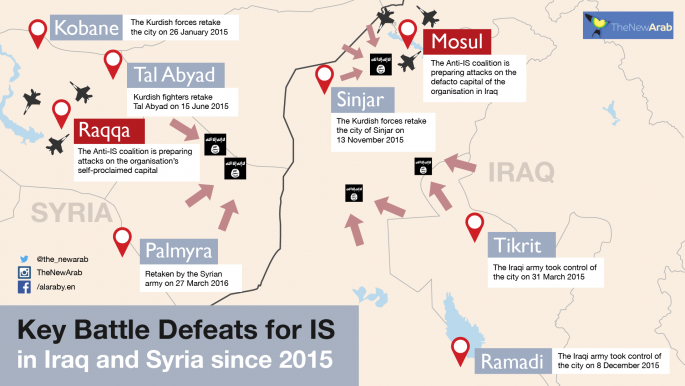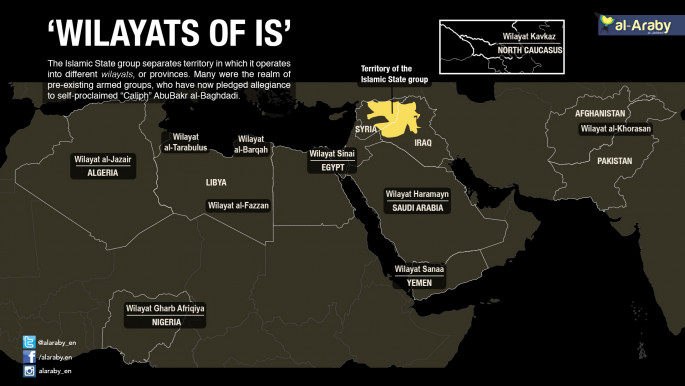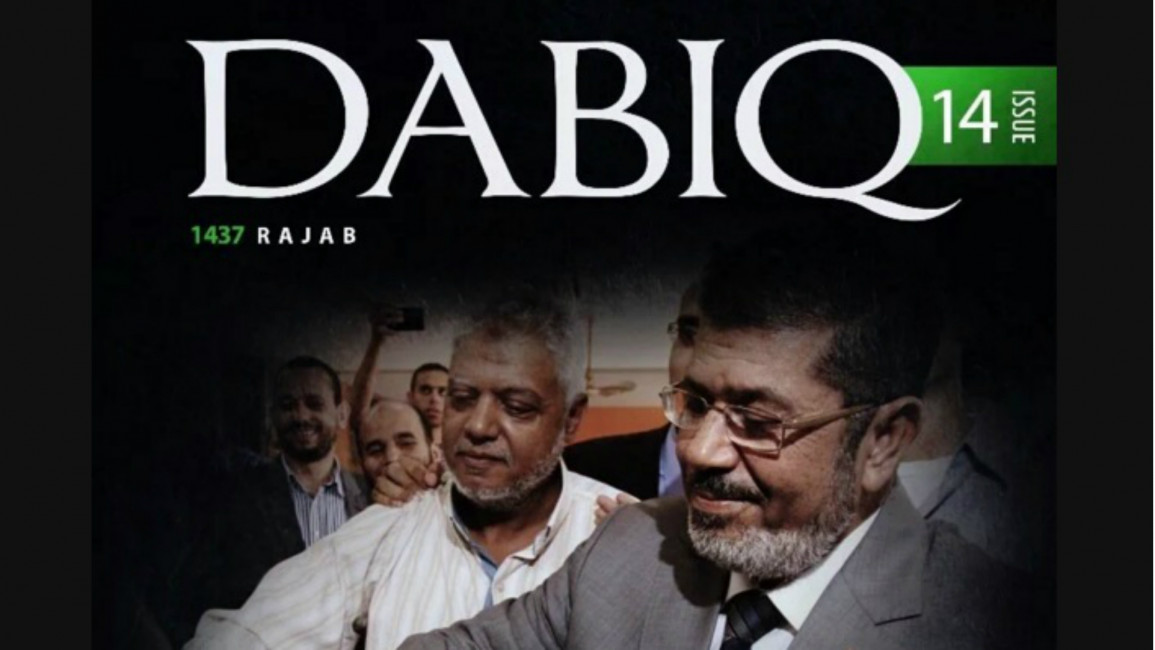'Apostate': IS magazine berates ousted Egypt president Morsi
'Apostate': IS magazine berates ousted Egypt president Morsi
The latest issue of the Islamic State group's online publication features Mohammed Morsi on the front page, describing him as an "apostate", and confirming the perpetrators of the Paris attacks.
3 min read
The latest issue of the Islamic State magazine slams Egypt's former president [Getty]
In the latest issue of the Islamic State group online magazine, Dabiq, the Muslim Brotherhood has been branded "apostates" - meaning that, in the eyes of the barbarous militants famed for grisly executions, Brotherhood members should no longer be called Muslims.
The militants described the Muslim Brotherood as "a devastating cancer" that "emerged, mutated, and spread, attempting to drown the entire Ummah in apostasy".
The front cover of the magazine features Mohammed Morsi, the former president of Egypt, who was ousted in a military coup in 2013 - after which the group was outlawed.
In a feature article, IS said the Muslim Brotherhood had cooperated with the Rafidah, a derogatory term reserved for Shias by the Sunni extremists. They said that the Muslim Brotherhood had issued statements in support of Iran and preached "Islamic Unity" between Shia and Sunni sects of Islam.
The magazine also said that the Muslim Brotherhood "pioneered the deviant call to interfaith among Muslims, Christians, and Jews".
IS cited Hassan al-Banna, the spiritual founder of the Muslim Brotherhood in Egypt, who said "pure Islam does not oppose a religion nor destroy another creed," and referred to Egyptian Christians as "brothers".
They also criticised the Muslim Brotherhood for working through political systems and stuctures - including democracy and adherence to constitutions - to achieve its aims.
The militants also accused the group of adhering to secular ideologies such as political plurism.
They cited the the fourth "general guide" of the Muslims, Muhammad Hamid Abu Nasr who said: "We believe that Islamic rule must permit for political party pluralism because as the opinions increase the gains increase."
The Islamic State group also looks disparagingly on statements from Muslim Brotherhood leaders that emphasise the importance of human rights - saying that such is advocating for the "right to commit apostasy, devil-worship, sodomy and fornication".
IS has continually described other Islamic groups as "apostates", including al-Qaeda - which they say are influenced by the Muslim Brotherhood.
The militants described the Muslim Brotherood as "a devastating cancer" that "emerged, mutated, and spread, attempting to drown the entire Ummah in apostasy".
The front cover of the magazine features Mohammed Morsi, the former president of Egypt, who was ousted in a military coup in 2013 - after which the group was outlawed.
In a feature article, IS said the Muslim Brotherhood had cooperated with the Rafidah, a derogatory term reserved for Shias by the Sunni extremists. They said that the Muslim Brotherhood had issued statements in support of Iran and preached "Islamic Unity" between Shia and Sunni sects of Islam.
The magazine also said that the Muslim Brotherhood "pioneered the deviant call to interfaith among Muslims, Christians, and Jews".
IS cited Hassan al-Banna, the spiritual founder of the Muslim Brotherhood in Egypt, who said "pure Islam does not oppose a religion nor destroy another creed," and referred to Egyptian Christians as "brothers".
 |
|
| Analysts suggest the attacks in Europe followed successive defeats for IS in key battlegrounds in their Syria-Iraq strongholds [click to enlarge] |
They also criticised the Muslim Brotherhood for working through political systems and stuctures - including democracy and adherence to constitutions - to achieve its aims.
The militants also accused the group of adhering to secular ideologies such as political plurism.
They cited the the fourth "general guide" of the Muslims, Muhammad Hamid Abu Nasr who said: "We believe that Islamic rule must permit for political party pluralism because as the opinions increase the gains increase."
The Islamic State group also looks disparagingly on statements from Muslim Brotherhood leaders that emphasise the importance of human rights - saying that such is advocating for the "right to commit apostasy, devil-worship, sodomy and fornication".
IS has continually described other Islamic groups as "apostates", including al-Qaeda - which they say are influenced by the Muslim Brotherhood.
Also in the magazine, the Islamic State group praises the attackers who killed 32 in Brussels last month, and hailing the two suicide bomber brothers as key actors in November's bloodbath in Paris as well.
The extremist group has claimed responsibility for both acts of carnage targeting Western European capitals.
"All preparations for the raids in Paris and Brussels started" with Ibrahim El Bakraoui, 30, and his brother Khalid, 27, Dabiq said. "These two brothers gathered the weapons and the explosives."
It is "firstly due" to the El Bakraouis that the November 13 attacks that killed 130 victims in the French capital occurred, Dabiq said. Subsequently, it said, Khalid El Bakraoui had a dream "which motivated him to carry out another istishhadi [martyrdom] operation".
The younger El Bakraoui blew himself up in a rush-hour Brussels subway train on March 22, killing 16 victims. That same morning, his older brother was one of two suicide bombers who detonated explosives-laden suitcases at Brussels Airport, killing another 16.
Dabiq also confirmed Belgian and French police findings that Najim Laachraoui, the second Brussels Airport suicide bomber, manufactured the explosives used in both the Paris and Brussels attacks.
The extremist group has claimed responsibility for both acts of carnage targeting Western European capitals.
"All preparations for the raids in Paris and Brussels started" with Ibrahim El Bakraoui, 30, and his brother Khalid, 27, Dabiq said. "These two brothers gathered the weapons and the explosives."
It is "firstly due" to the El Bakraouis that the November 13 attacks that killed 130 victims in the French capital occurred, Dabiq said. Subsequently, it said, Khalid El Bakraoui had a dream "which motivated him to carry out another istishhadi [martyrdom] operation".
The younger El Bakraoui blew himself up in a rush-hour Brussels subway train on March 22, killing 16 victims. That same morning, his older brother was one of two suicide bombers who detonated explosives-laden suitcases at Brussels Airport, killing another 16.
Dabiq also confirmed Belgian and French police findings that Najim Laachraoui, the second Brussels Airport suicide bomber, manufactured the explosives used in both the Paris and Brussels attacks.
 |



